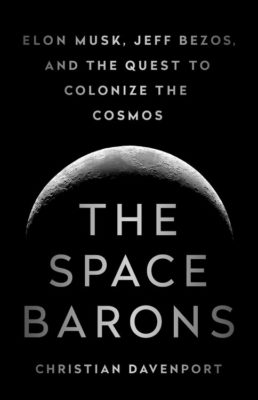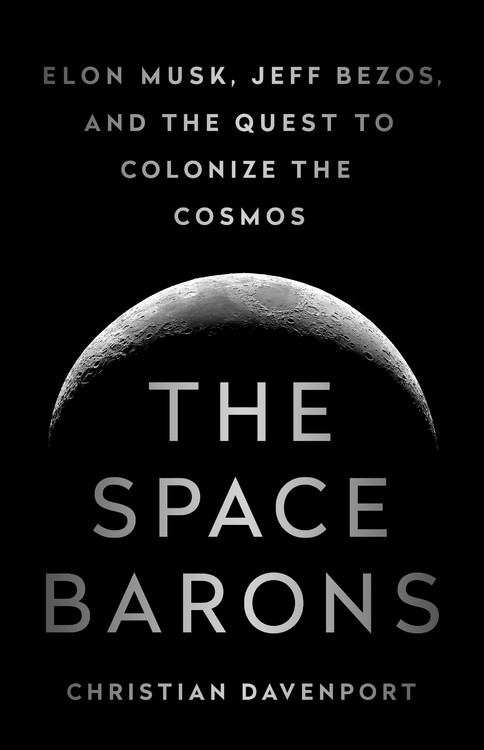The Space Barons is the longest and best-written press release I’ve ever read.

When, in the ending acknowledgment, author Christian Davenport thanked the billionaires so gracious with their time, including his own ultimate boss at the Washington Post (Jeff Bezos), it became much clearer how such a long work of this genre had come about and my disappointment resolved itself into a numb acceptance.
The title the publisher chose promised a very different sort of book, more critical and honestly probing than an employee can reasonably be expected to write of their employer while maintaining employment. In a world where journalism continues to desiccate because its lifeblood is disappearing into the distended bellies of Facebook and Google, all journalism resembles tech journalism.
Oh golly, wow! Which public-private space company is going to be the neatest going forward? is about as much as a person could reasonably ask for, and the competing book Rocket Billionaires by Tim Fernholz ended up with the more serviceable title and possibly the original premise.
However, the title I had was The Space Barons, and I was not prepared for the sincerely fawning devotion to a cyberpunk dystopia that I discovered myself to be reading. Now, on the progressive left, I fully acknowledge that race, gender, and class criticism can veer from valuable tool into a hammer in want of a nail too easily. Not every book has to be about those things to be useful or is best served by being analyzed on those terms.
But the myopia of The Space Barons is beyond parody. The most extreme example of this is the introduction to Elon Musk and the straight-faced description Davenport allows Musk’s brother Kimbal to give of their upbringing.
“It’s pretty rough in South Africa,” Kimbal told Esquire. “It’s a rough culture. Imagine rough — well, it’s rougher than that. Kids gave Elon a very hard time, and it had a huge impact on his life.”
The anecdote goes on to relate that the boys attempted to open a video arcade as teens without telling their parents, who were furious the boys did so without asking and wouldn’t sign the permits.
I am entirely fine with providing Musk’s background as a way to understand him, and I’m not in any way opposed to describing the difficulties of a non-neurotypical person struggling in society with bullying or abusive parenting.
I am, however, fairly certain I can imagine conditions more difficult than would be in effect for a white South African during apartheid without even needing to leave South Africa for the comparison.
Similarly, I can empathize with Richard Branson’s experience of dyslexia and struggles with school but this is not quite the same thing as an underdog story, not quite accurate to characterize him as overcoming a hardscrabble childhood, when his learning disability was in the context of a top-tier private school that his family could afford in the first place; his path to knighthood is something less of a surprising achievement when his grandfather Sir G.A.H. Branson was also knighted and a judge on the high court of England and Wales.
Davenport references another book about Jeff Bezos, The Everything Store, and something that comes across there but not in this is how much Bezos’s success is due not just to his own drive and hard work, not even just to the fortune of world events, but to the wealth of his family.
They could afford to send him to Princeton University, where he could get an excellent education, make connections, and go and work on Wall Street to make more money and connections. He took advantage of these opportunities by making good impressions, but he still had to have family members willing and able to invest hundreds of thousands of dollars in the idea of Amazon.com for it to get off the ground and make good on its potential.
These are exceptional people, to be sure, but they also had the exceptional means to be able to capitalize on it. Narratively, it’s more satisfying to root for an underdog than someone who started off with advantages they didn’t squander, but that doesn’t mean every story is that or needs to be that. The Bible has many archetypal conflicts; not all are David against Goliath.
If any of these men had been less wealthy to start, or been identified as an undesirable social group, it’s difficult to imagine how they would have overcome the barriers to their success even with their particular brilliance and hard work.
South Africa is ninety percent black; the Zulu and Xhosa-born geniuses of Musk’s generation could not legally open an arcade to fail or easily emigrate to some other country. Likewise, had any been women, it’s unlikely their personalities would have allowed them to have success as the heads of their companies.
There is no non-pejorative equivalent to “playboy” for a grown woman. Women who act as demanding or ruthless as Bezos or Musk typically aren’t respected as confident, exacting bosses, but as shrews and worse.
Women, in general, appear very rarely in the narrative of The Space Barons except as props, such as an offhand reference to a man on an island who already had sex with every woman younger than sixty there or wife who misses her overworked husband as he tries to complete a project or bosomy Pamela Anderson falling out of her dress during an event with Virgin Airlines.
The one real exception isn’t even an exception: Davenport quotes SpaceX president and Chief Operating Officer Gwynne Shotwell multiple times for her perspective going as far back as the seventh employee of the company but without ever receiving any explanatory biography or showing any interest in her except in her capacity to explain Musk.
This is in stark contrast to the chapter he devotes to an inconsequential billionaire gambler notable only because his attempt at a private space organization completely failed before the others, or even multiple paragraphs of backstory to a helicopter pilot who crashed a plane carrying Jeff Bezos.
Bezos and Musk like to imagine themselves as heirs to the dream of Star Trek and other science fiction utopias, often quite literally. Through their companies, both have obviously done much to improve the world in certain ways.
But unlike the book Davenport sometimes references, The Everything Store by Brad Stone explores the power and innovation of Amazon without ignoring how it behaves nightmarishly to weaker startups or to its own employees and contractors, particularly warehouse workers.
It’s all fine and good to remark how Bezos dreams of perhaps, you know, one day moving all industry to space to make the surface of the earth something closer to a global park, but we don’t typically judge people on the things they’d like to do, just what they’ve done repeatedly and are doing.
Being asked to work seventy-three hours a week to get a company off the ground then being fired for organizing labor isn’t a cute quirk. Yelling at employees on a factory floor when you’re their billionaire boss isn’t just an example of the unique pluck of startup culture: it’s abuse. Wanting to track every moment of rest a laborer has, steal their wages from when they’re forced to stand in line for the job, and hiding billions in profits to avoid taxes isn’t savvy. It’s exploitative.
I don’t think Captain Picard ran the Enterprise on the basis of everyone signing non-disclosure agreements. We can believe these barons would like to some day behave in a different way, but that doesn’t mean ignoring how they actually treat people under their power now, in the present.
Journalism, to be good, doesn’t have to be strictly negative, but it does have to include more than one point of view before it arbitrates truth.
If you read a work uncritically relating how the Soviet Union made superior advancements in the Cold War space race by subordinating the value of individual cosmonauts’ lives to common needs of its people’s space program while deriding how the United States and NASA got hung up on bureaucratic safety precautions due to being overly sentimental to its astronauts’ safety, this would make sense in the context of Pravda but not really an objective chronicle of truth.
Private space companies are willing to cut costs because something will be “a whole lot cheaper and probably work just as well”; that’s fine, except that NASA has been responsible for the deaths of people and apparently has the opinion human lives in the space program are intrinsically valuable.
Risking the lives of pilots with a spaceship that’s “unsafe, insufficiently tested, and poorly understood” in order to get a big contract and advance technology isn’t necessarily the wrong long-view to have. In the end, the benefits may bear out to be worth it. But I’m not convinced there’s anything brave about Sir Richard Branson staying on as CEO because he had the courage to let someone else die in order to make his company even more valuable later.
Bezos’s company Blue Origin is exhaustingly praised throughout The Space Barons for its motto that “slow is smooth and smooth is fast”, but NASA’s unwillingness to put human lives in danger is treated as bureaucratic intransigence.
I am less bothered by this being the conclusion the book comes to than that the book never bothers to treat the startup cult’s disregard of actual people as anything deserving a second thought.
Again, this is tech journalism and reporting under patronage in a nutshell. With private companies working to take more of a share of satellite Internet, perhaps it’s future communication in a nutshell, too.
If we aren’t willing to demand more from the companies and billionaires we have while they’re still largely limited to the terrestrial sphere, we may not be able to ask more from them in the future.

